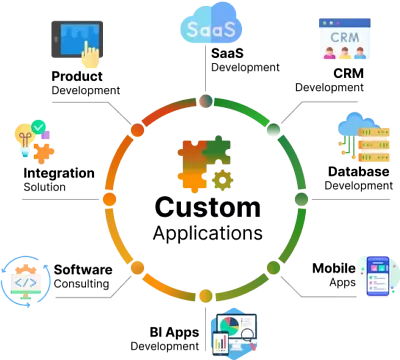The Importance of Data Backup and Disaster Recovery Planning

In today’s digital age, data is one of the most valuable assets for any business. Whether it’s customer records, financial information, internal communications, or operational documents, losing data can lead to significant financial loss, legal implications, and reputational damage. That’s why robust data backup and disaster recovery (DR) planning is not just an IT task—it’s a business imperative.
In this comprehensive guide, we’ll explore why data backup and disaster recovery are crucial, especially for small to mid-sized businesses. We will also highlight how leveraging IT support and services, including custom software development solutions and email hosting for small business, can create a resilient IT infrastructure that safeguards your operations.
What Is Data Backup and Disaster Recovery?
Data backup refers to the process of copying and storing data in a secure location so it can be restored in the event of loss or corruption. Disaster recovery is a broader strategy that involves restoring IT systems and data after a catastrophic event, such as a cyberattack, natural disaster, or hardware failure.
Together, these processes ensure business continuity and minimize downtime.
Why Is Data Backup Important?
Here are some of the most compelling reasons why businesses must prioritize data backup:
- Protection Against Data Loss: Hardware failures, accidental deletions, or cyberattacks can result in data loss. Backup ensures a copy is available for recovery.
- Regulatory Compliance: Industries like healthcare and finance must meet data retention regulations. A solid backup system ensures compliance.
- Quick Recovery: Reliable backups allow for faster recovery of information, minimizing business disruption.
- Cybersecurity Defense: Backups are critical during ransomware attacks. If your data is encrypted by malicious actors, backups enable you to restore files without paying ransom.
The Role of Disaster Recovery Planning
A disaster recovery plan outlines steps a business takes to restore operations after a disruptive incident. It typically includes:
- Risk Assessment and Business Impact Analysis
- Recovery Time Objective (RTO) and Recovery Point Objective (RPO)
- Backup and Storage Strategies
- Communication and Response Procedures
- Regular Testing and Updates
A comprehensive disaster recovery strategy supported by IT support and services ensures that your organization can bounce back quickly and efficiently from any data-related crisis.
Why Small Businesses Can’t Afford to Ignore It
Many small businesses mistakenly believe they are not targets for cyber threats or disasters. However, the opposite is often true:
- Limited Resources: Smaller companies often lack dedicated IT teams, making them more vulnerable to prolonged downtime.
- High Stakes: The cost of downtime is disproportionately high for smaller firms.
- Compliance Risks: Failing to meet data protection regulations can lead to hefty fines.
This is where email hosting for small business and custom software development solutions tailored to small business needs can make a significant difference. They offer reliable and scalable solutions without overburdening limited resources.
Key Technologies and Services to Support Backup and DR
To implement a strong backup and disaster recovery strategy, consider the following tools and services:
1. Cloud-Based Backup Solutions
- Automatically store data offsite
- Scalable and secure
- Accessible from anywhere
2. On-Premise Backup
- Quick data recovery
- More control over storage
- Ideal for large data volumes
3. Managed IT Services
Partnering with a provider of IT support and services ensures you have experts managing your data security, backup protocols, and disaster recovery planning.
4. Custom Software Solutions
Using custom software development solutions, you can build tailored disaster recovery applications that integrate seamlessly with your business systems.
5. Reliable Email Hosting
The best email hosting for small business includes backup and redundancy features, so you never lose access to critical communication channels.
Best Practices for Data Backup and Disaster Recovery
- Follow the 3-2-1 Rule: Keep three copies of your data, on two different media, with one copy stored offsite.
- Automate Backups: Schedule regular, automatic backups to eliminate human error.
- Test Regularly: Conduct mock drills and data recovery tests to ensure systems work as expected.
- Encrypt Data: Always encrypt backup data for security.
- Document Everything: Maintain up-to-date disaster recovery documentation.
Real-World Examples of Backup and DR in Action
Example 1: A Law Firm Hit by Ransomware
A mid-sized law firm suffered a ransomware attack that encrypted all their client files. Fortunately, their IT support and services provider had implemented regular cloud backups. Within hours, they restored data and resumed operations, avoiding ransom payment and legal consequences.
Example 2: Retail Store Fire
A fire destroyed the physical location of a retail store. With a disaster recovery plan in place, they quickly moved operations online and accessed customer data from cloud backups, minimizing revenue loss.
The Financial Impact of Not Having a DR Plan
Failing to have a disaster recovery plan can lead to:
- Extended Downtime
- Revenue Loss
- Data Breaches
- Reputation Damage
- Compliance Penalties
Investing in custom software development solutions and the best email hosting for small business is far more cost-effective than the expenses incurred from unplanned outages.
How to Choose the Right Backup and DR Partner
When evaluating vendors for backup and disaster recovery, consider the following:
- Experience with Your Industry
- Proactive Monitoring and Alerts
- Service-Level Agreements (SLAs)
- Scalable Solutions
- Strong Data Security Practices
An experienced IT support and services provider will guide you through every step of the process—from risk assessment to recovery testing.
Expanding the Scope: Why Every Business Needs a Proactive Data Recovery Strategy
As organizations increasingly rely on digital infrastructure, the risks associated with data loss continue to escalate. Beyond natural disasters or hardware failures, emerging threats like ransomware attacks and accidental deletions can have devastating effects. To effectively mitigate these risks, businesses must adopt a proactive and layered approach to data protection.
Real-Time Monitoring and Automation
Real-time monitoring tools can detect anomalies or disruptions in the backup process. Integrating automation into your backup strategy reduces the dependency on manual processes, which are often prone to error. Automated backups also ensure consistency, especially in environments with large volumes of data.
Cloud-Based Backup Solutions
Cloud-based backups offer scalability, redundancy, and accessibility. For small businesses, partnering with a provider offering email hosting for small business that includes automated backup and recovery options is crucial. The best email hosting for small business providers often bundle these features as part of a broader security package, enhancing resilience.
Periodic Recovery Drills
A well-documented plan is only as good as its execution. Regular disaster recovery drills ensure that all stakeholders understand their roles and responsibilities. These simulations highlight gaps in processes, allow for iterative improvements, and boost confidence in the system’s reliability.
Partnering with Experts
Many companies, especially startups, lack the in-house technical expertise to build and maintain robust recovery systems. Collaborating with an experienced IT service provider or a team that offers custom software development solutions ensures that your backup systems are tailored to your unique business needs. These specialists can also offer IT support and services that go beyond implementation—ensuring continued optimization and scalability.
Regulatory Compliance and Industry Standards
Certain industries are bound by strict data protection regulations, such as GDPR, HIPAA, or FINRA. Regular audits, coupled with reliable backup solutions, help meet compliance requirements and avoid legal penalties. This is another area where experienced providers of IT support and services become invaluable—they can align your systems with current standards while ensuring business continuity.
Incorporating these strategies doesn’t just minimize risk—it builds a foundation of trust with your clients, partners, and stakeholders. Investing in comprehensive backup and disaster recovery planning demonstrates a commitment to security, reliability, and long-term success.
Final Thoughts
In an era where data is the backbone of business operations, ensuring its safety should be a top priority. Data loss and downtime can cripple a business, especially in highly competitive or regulated industries. That’s why data backup and disaster recovery planning is essential.
By investing in custom software development solutions, secure email hosting for small business, and professional IT support and services, you not only protect your assets but also empower your business to thrive in any situation. Whether you’re a startup or an established enterprise, proactive planning today can save you from catastrophic losses tomorrow.
Take the Next Step with Ideas2Goal
At Ideas2Goal, we specialize in designing scalable, secure, and reliable IT strategies tailored for your business. From the best email hosting for small business to customized disaster recovery plans, our experts are here to support your growth every step of the way.
Contact us today to learn how we can future-proof your operations with intelligent, effective IT solutions.



